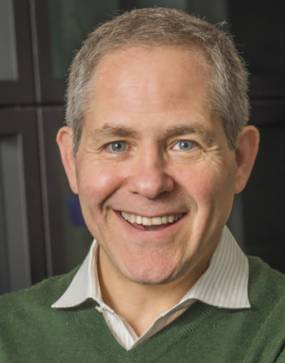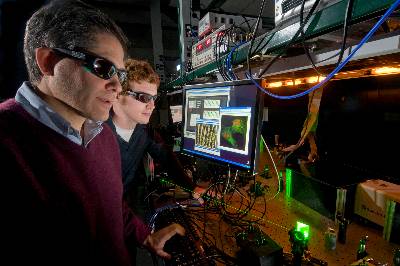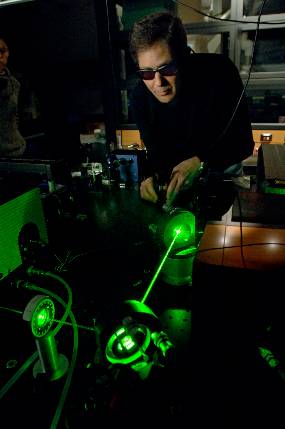Marcos Dantus receives prestigious American Chemical Society Ahmed Zewail Award
Michigan State University chemist Marcos Dantus is the 2023 recipient of the prestigious American Chemical Society (ACS) Ahmed Zewail Award in Ultrafast Science and Technology.
The award, sponsored by the Ahmed Zewail Endowment Fund established by the Newport Corp. (a supplier of photonics technology and products) recognizes outstanding and creative contributions to fundamental discoveries or inventions in ultrafast science and technology in the areas of physics, chemistry, biology or related fields.

Marcos Dantus, MSU Foundation Professor and University Distinguished Professor, is the 2023 recipient of the prestigious Ahmed Zewail Award in Ultrafast Science and Technology from the American Chemical Society. Courtesy photo
Dantus, an MSU Foundation Professor and University Distinguished Professor, is a pioneer in the use of spectrally and temporally shaped ultrafast pulses and the inventor of revolutionary laser optimization instruments. His research utilizes ultrafast lasers to explore high-energy chemical reactions, detect cancer, and trace explosives. Dantus is incorporating computer-controlled lasers to speed up advanced photonic materials characterization by orders of magnitude.
Dantus has excelled in the field of ultrafast science since his time at the California Institute of Technology. As a graduate student in Zewail's program, Dantus built the laboratory and carried out a series of research projects that helped create the branch of science now known as femtochemistry, the area of physical chemistry involving the study of chemical reactions on an extremely short “femtosecond” (one millionth-of-a-billionth of a second) timescale.
“I am honored and very excited to be recognized by this award,” said Dantus, who holds joint appointments in the Department of Chemistry and the Department of Physics and Astronomy in the College of Natural Science. “This award is of particular significance for me given that I played an important role in Zewail’s research group. I appreciate that this award recognizes both scientific and technological contributions to ultrafast laser science. I enjoy making both fundamental scientific discoveries and developing tools that can help society.”
Dantus’ 1991 Ph.D. thesis titled “Femtosecond Transition-State Spectroscopy of Chemical Reactions,” includes the research publications that led to Zewail winning the 1999 Nobel Prize for Chemistry. As a postdoc student in Zewail’s group, Dantus built a lab for ultrafast electron diffraction, a method capable of capturing changes in molecular structure during chemical reactions with femtosecond time resolution.

During his distinguished career, Dantus’s research in ultrafast lasers has contributed to the Nobel Prize in chemistry and novel applications in the medical and defense industries among others. Credit: Kurt Stepnitz
Bringing his expertise and accomplishments to MSU in 1993, Dantus was the first to capture snapshots of a concerted chemical reaction involving the breaking of two-bonds and the formation of a new bond in an ultrafast dynamic process. He was also the first to demonstrate use of the laser to cause ultrafast bond formation between a pair of free atoms in a process known as photoassociation.
During his distinguished tenure at MSU, Dantus has pioneered efforts in coherent control of chemical reactions and nonlinear optical processes, including the invention of an instrument capable of automatically measuring and correcting the phase of femtosecond laser pulses. This technology was patented, commercialized, and is now being used to optimize scientific and industrial femtosecond lasers.
In addition, Dantus, together with his diverse research team, has published more than 250 publications. He currently has 47 inventions disclosed, 32 patents issued, and 16 technologies licensed to industry.
“We are fortunate to have Marcos Dantus, a global leader and innovator in the field of ultrafast science, as a member of our faculty,” said Douglas Gage, vice president of MSU’s Office of Research and Innovation. “His innovative research and collaborative approach to applying his technology to novel areas, such as in vivo biological imaging, is representative of the groundbreaking work being done at Michigan State. This recognition of Marcos further enhances MSU’s reputation for excellence in research and serves to highlight the significant impact of his work on society now and in the future.”

Dantus’s research focuses include understanding and controlling chemistry under intense laser field radiation, biomedical imaging and sensing, and development of novel spectroscopic approaches. Credit: Kurt Stepnitz
Dantus received his Ph.D. in chemistry from the California Institute of Technology and his B.A. and M.A. in chemistry from Brandeis University in Waltham, Mass. His many honors and accolades include election as a fellow of the National Academy of Inventors, the American Physical Society, and the Optical Society of America, and his selection as MSU Innovator of the Year in 2013. Dantus is also a dedicated instructor, as evidenced by his receipt of an ACS Nobel Laureate Signature Award for Graduate Education in Chemistry and an MSU Teacher-Scholar Award.
Dantus was nominated for the Zewail award by James McCusker, an MSU Foundation Professor of chemistry and internationally renowned physical-inorganic chemist whose research focuses on ultrafast excited-state dynamics of transition metal compounds.
“It was my honor to nominate Marcos for the ACS Zewail Award in Ultrafast Science and Technology, and I was absolutely thrilled when I found out he had won,” McCusker said. “Marcos has played a pivotal and defining role in the development of the field of ultrafast science since its earliest stages. His time at Michigan State has been characterized by many important, transformational contributions to both the science and technology of ultrafast spectroscopy. He is richly deserving of this recognition, and I was happy to play a small part in helping to bring this about.”
Dantus will receive a certificate and a prize of $5,000 at an awards ceremony on March 28, 2023, in conjunction with the ACS Spring 2023 meeting in Indianapolis.
Banner image: Michigan State University chemist Marcos Dantus is the 2023 recipient of the American Chemical Society’s Ahmed Zewail Award in Ultrafast Science and Technology. Dantus is a pioneer in his work with ultrafast lasers—an innovation that takes a low intensity, long pulse and compresses it to increase its energy. These lasers are ideal for probing and controlling chemical reactions and for use in biomedical imaging and sensing. Credit: Kurt Stepnitz